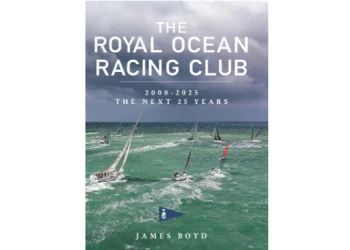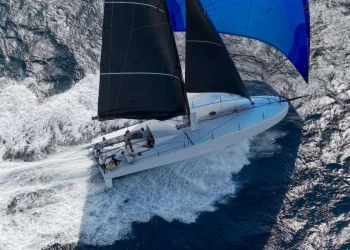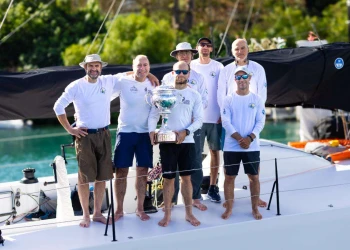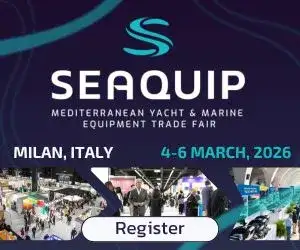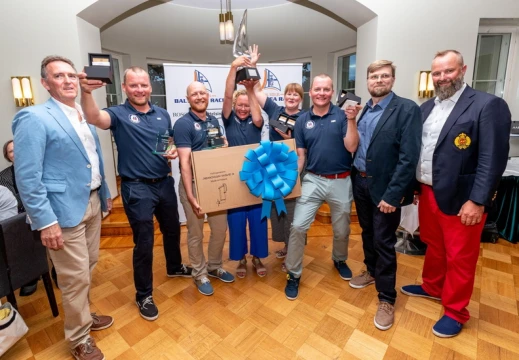
The jubliant crew of the Finnish H-323 Silver Moon II - first recipients of the Baltic Sea Race Trophy and a spoil of prizes
Winners celebrate at Roschier Baltic Sea Race
Over 200 sailors from 18 different nations raced in the inaugural Roschier Baltic Sea Race - the new 635-mile race starting and finishing in Helsinki, Finland and organised by the Royal Ocean Racing Club (RORC) in association with the Ocean Racing Alliance. Teams from Poland, Germany, Sweden and Finland won honours in the race, with a fairy tale overall victory for the smallest boat in the race.
The Roschier Baltic Sea Race Prize Giving was held on Wednesday 27th July at Katajanokka Casino, Helsinki. RORC CEO Jeremy Wilton thanked the official race supporters and hard-working volunteers to a terrific round of applause from the competing sailors.
RORC Racing Manager Chris Stone was the Master of Ceremonies awarding the prize winners. Ari Känsäkoski who was racing on Enderpearl, spoke on behalf of the Ocean Racing Alliance: "I think everything went very well. This is Finland, a place that gets things done. The combination of world-class race organisation with RORC brings good results. In 2024 we aim to have more boats and we are already building the plan to get everything ready for the second race when we will do even better."

Ari Känsäkoski (centre) was racing on Kenneth Bjoerklund Enderpearl and spoke on behalf of the Ocean Racing Alliance at the Roschier Baltic Sea Race Prizegiving © Pepe Korteniemi
Finnish H-323 Silver Moon II, skippered by Salla Kaven won the Roschier Baltic Sea Race having scored the best time after IRC correction. There was a standing ovation for the crew of Silver Moon II as they received the Baltic Sea Race Trophy. Since they were children, the Kaven family have raced the 9.9 metre sloop on Lake Päijänne in Southern Finland.
"I am speechless, just so happy, we never thought we could win this race. It was great sailing, and everything went well, but even when we crossed the line, I didn't believe it." commented Salla Kaven. "The message to all the amateur sailors out there is: "You can do it if you want to; do what you love."
Crew of Silver Moon II: Salla Kaven, Heidi Ekholm, Kari Itkonen, Jorma Kaven, Jouni Kaven.

I Love Poland, owned by the Polish National Foundation and sailed by a young crew, skippered by Grzegorz Baranowski, crossed the finish line in Helsinki to take Line Honours for the Roschier Baltic Sea Race. The elapsed time of 3 days, 0 hours, 27 minutes, 37 seconds is the Monohull Race Record.
Janne Kjellman's Finnish TS42 Squid, the only multihull in the race, set the race record for Multihull Line Honours of 4 days, 7 hours, 29 minutes, 33 seconds.
The lead was constantly swapping hands between three teams: VO65 Ambersail 2 sailed by American skipper Clarke Murphy, VO70 GP Bullhound sailed by Per Roman, and I Love Poland - all had victory in sight during the race. In the final few miles, an astonishing light airs battle saw Tilmar Hansen's German TP52 Outsider catch up 30 miles to join the race for Line Honours. I Love Poland crossed the finish line just 700 metres ahead of Outsider after 72 hours of racing. GP Bullhound was less than an hour behind. Ambersail 2 finished fourth, after at one stage having an 18 mile lead.

The Joliette Trophy for Multihull Line Honours was presented to Janne Kjellman's Finnish TS42 Squid © Pepe Korteniemi
I Love Poland was presented with the Bobby Lowein Wheel for winning Monohull Line Honours. The trophy was a highly regarded award for past performance racing classes in the Fastnet Race. Previous winners include Rothmans, Alexia, Longobarda and Leopard; and now I Love Poland.
"The plan was to fight to the end and it was exactly that. There were a few wind holes but we crossed the line first and we are delighted. When I look at the names on this trophy we are so proud that ours will go with them. I am even more proud of my young crew who are trying their best to go forward. Thank you to the organisers of this race, it has been a privilege to compete in the first Roschier Baltic Sea Race," said Grzegorz Baranowski, skipper of I Love Poland.
The Hamburgischer Verein Seefahrt (HVS) owns German Carkeek 47 Störtebeker. Skippered by Torben Muehlbach the young team came so close to winning the race overall under IRC, but in the end came third in the overall ranking. However, Störtebeker won IRC Zero, beating Tilmar Hansen's Outsider and the largest boat in the race, Kenneth Bjoerklund's CNB 76 Enderpearl. The HVS was established in Hamburg, Germany in 1903. Under its constitution the HVS develops young sailors in offshore racing.
"I don't think we made any big mistakes. Of course, there are always some things to improve and we will analyse everything afterwards. Everyone on board learned more and that was our goal. We are so proud to have beaten Outsider, a famous team and we didn't think we would at the start of the race. This new course is very interesting with many different conditions. It is so nice to rely on the nice people from the RORC to organise the race, we have complete confidence in their management. Above all we had fun and that will continue for the HVS."

Teams from Sweden, Finland and Great Britain filled the IRC One podium. Swedish Farr 400 Wetjob, skippered by Niclas Heurlin was the winner of IRC One. Arto Linnervuo's Finnish Xp 44 Xtra Staerk was second and the first boat from Finland to cross the line in Helsinki. Ed Bell's British JPK 1180 Dawn Treader was third.
"This is our home turf and RORC organise great races so that is why we jumped on the train from the beginning," commented Wetjob's Niclas Heurlin. "We are incredibly happy with our win against really good opposition. For us this was a very long race; 650 miles is a challenge, so that was inspiring. We know Gotland very well but this time we went around it the other way! We know the weather there, so that was an advantage for us."
"I am really proud of the Xtra Staerk team for being the first Finnish team to cross the line," commented Arto Linnervuo. "To have this race attract international teams takes Finnish offshore sailing to a higher level and that is my aim; to help the offshore racing community thrive in the Baltic and to come better together."
Finnish H-323 Silver Moon II, skippered by Salla Kaven was the winner of IRC Two. Swedish Albin Nova Team Mobline raced Two-Handed by Paer Lindfors & Nadine Kugel was second. Third was Margus Uudam's Estonian J/112 Nola.
In IRC Two-Handed Team Mobline was the winner. Julius Haartti & Sanna Moliis racing Finnish J/109 Irie was second, and third was Anders Lundmark and Louise Edgren racing Figaro 2 The Spirit. Paer Lindfors was celebrating his birthday as Team Mobline finished the race winning IRC Two-Handed. The 33ft sloop was designed in 1981 by Peter Norlin. About 500 have been built and there is an active Albin Nova Class in Sweden.
"The Albin Nova is not designed to any rule, just as a perfect all-round cruising boat; the boat has clean lines with no strange features. The design sails well in light and heavy wind. It was a great race with fantastic conditions to the finish. During the last night we had our big spinnaker up which may have been too much sail, but it held and Nadine scored the top speed record. Helsinki is a fantastic city with great cafes and restaurants and the race itself is a great course. Starting and finishing in Helsinki you go straight out to the open ocean. The communication with the race management team was perfect. We would definitely encourage other teams to come to race in 2024."
RORC Race Manager Chris Stone commented after the race: "The Baltic Sea can throw everything at you and safety is always a first stop for any RORC race. Everybody got home safely with no problems at all; that is always the best outcome. A lot of thought went into the course and this time, the back markers had 300 miles of downwind racing to the finish. However, the weather is so changeable in the Baltic Sea, it could well be different next time."
The second edition of the Roschier Baltic Sea Race will take place in the summer of 2024. Tremendous credit should go to the official race supporters and hard-working volunteers in Helsinki. The race is supported by the City of Helsinki, the Nyländska Jaktklubben (NJK), Finnish Ocean Racing Association (FORA), Helsingfors Segelklubb (HSK), FINIRC and the Xtra Stærk Ocean Racing Society.





